|
The common question people ask me during these months of book presentations, signings, and book talks of Baltimore's Little Italy is: "How many books did you sell?" And my standard answer is that the sales don't matter. I'm not paying attention to the numbers ... I'm more interested in the reactions. It is much more meaningful how the book affects people - how excited they get over it. More valuable than any monetary amount from book sales is the precious collection of comments readers have emailed, verbalized, facebook posted, and handwritten to me by mail. All because Little Italy holds a unique place in their souls and hearts, as well as feeling pride for their Italian heritage.
You get the idea - all heartfelt words. People seemed to have been genuinely filled with emotion as they read the book's topics; and for those reactions, I feel delighted, accomplished, and truly grateful that I was blessed with the opportunity to write it.
At a book talk today in Highlandtown's Enoch Pratt Library, I was elated to meet two "characters" in the book (Dolly Della Noce Bekowitz and Willy Sydnor) who were friends in their youth and as I researched, shared memories of the Della Noce Funeral Home on Trinity Street. They told me that because of the book, their friendship has been reignited - after 40 years! They attended the book talk together and I felt truly giddy and pleased during the entire presentation thinking about them. How satisfying it was to learn this and to meet both of these happy ladies! So, let the publisher count the quantity of books sold. The question should not be: "How many books did you sell?" ... it should be: "How many people have been touched?" For this author, if I have moved even one soul, that is quite enough payment.
0 Comments
Everyone was your mother. They all had the right to discipline you and had no problem doing that. So if you were on another block and someone saw you messing up, they were going to scold you before your mother or your parents even got to you.
I was born and raised here. My mother was born over 77 years ago in the house in Little Italy where she still lives. It was my grandfather’s house; he died in 1976 at the age of 80. He came over from Italy in 1912 and we lived with him in his house until he died. So we had three generations together. My parents had one bathroom, one tub. I always tried to figure out … how did several families live in this one house? But you know they did it. This is still my home. When people ask where you’re from, I don’t say Lutherville, Maryland … I say Little Italy." I have a few favorite stories on the history of Little Italy that I covered in my book and I'd like to share one of the top favorites ... about Saint Leo's Italian Orphanage. It is typical of Italian folks to want to care for, feed and nurture others. I like to imagine that the spirit of that concept was exemplified in the scenario of the orphanage back in its day, as the nuns - and the loving residents of the neighborhood - took charge of their tiny young Italians, the orphans. I hope you enjoy reading the story, too.
"That was the best part of my life. We were treated like kings there, but what I didn’t do for them [POWs]. What I treasure most is a big plaque they gave me with the words: 'We will never forget what you did for us.'" – Guy Sardella 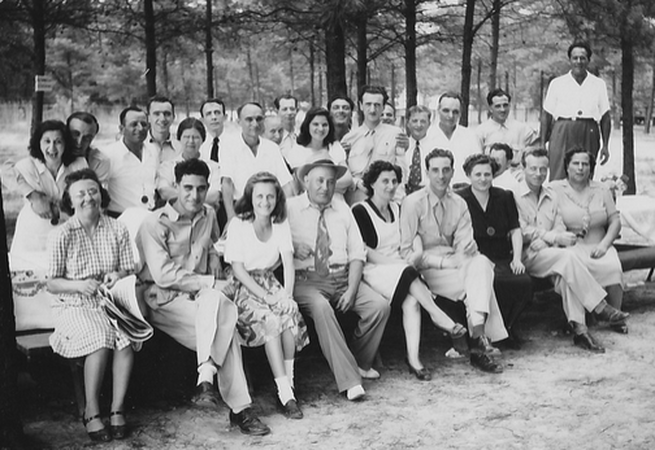 Italian POWs during World War II were given special privileges over the Japanese and Germans, like receiving visitors at Camp Meade (now Fort Meade) from Baltimore's Italian community on Sunday afternoons. Below is a chapter on this topic from "Baltimore's Little Italy: History and Heritage of The Neighborhood."
What do you feel passionate about in your life? Food? People? Career? Kids? Wine? Parenthood? (and wine while parenting!) ... perhaps a worthy cause, Baltimore (or your hometown), crafts, talents, skills, boating, baseball, horses, baking, politics, golf, patriotism, faith, religion, a lover, cookies, helping the underprivileged … the list is long and unique as each of us. We feel passionate about ALL kinds of things. Do you work, volunteer or spend time in some way living your passion? I hope so.
What is passion? Passion doesn’t always correlate with a sexual connotation. Besides the romantic feeling, passion is also described as a strong feeling of enthusiasm or excitement for something. Passion enthuses us. It spurs us on. It excites us. Passion can help us to complete our ideas to fruition. What does passion consist of? I made up this acronym: Purpose and pleasure Associate ourselves with it Satisfaction of living it Seduces and stimulates us Identify with it Oh boy! We know it when we find it Never enough of living it My four greatest passions are: FAMILY … WRITING … BEING ITALIAN … and CANNOLI. I mingled three out of the four to produce my book, Baltimore’s Little Italy: Heritage and History of The Neighborhood. (If I could have eaten cannoli simultaneously without getting cream filling all over my keyboard, I would have.) I deeply love the motherland of my four Italian grandparents; I have visited Italia six times since 2001 – and I’m not done yet – I’m heading back in September. I love being there because it feeds my passion of being Italian; I simply can’t get enough of Italy! In the tiny ancient town of Luras, Sardegna, staying in the house of my nonni, amidst the town’s crumbling stone houses, authentic corner stores, cobblestone streets, and listening to the beautiful language of rapid-fire Italian … all of my senses are alive. And when I can’t be in Italy, then I drive 35 minutes to Little Italy – a neighborhood I adore because of everything it stands for, including the start in America for two of my four nonni. As director of the Promotion Center for Little Italy, I work way over 40 hours a week – for free. Pro bono. Volunteer. Ask my husband and kids how much I am in my home office. Why? This particular work fuels my passion. It doesn’t feel like work. One of my favorite quotes: If you love what you do, you never work a day in your life. That's the way it is with our passions. We 'feel' them. We can't get enough of them. We're 'into' them. And when we aren’t, it feels dull, black-and-white, witless, one big Y-A-W-N. Yet when we have our noses stuck in something that we love, something that attracts us and interests us … it is reviving! Stimulating! We keep it near, we pour over it repeatedly, and we can't wait to get back to it. Passion. When we feel uninterested in something, it's mostly because it feeds none of our passions; it bores us. We want to discard it, walk away. It’s a drag … an obligation … a wet blanket. Can you think of an example of that in your life? And sometimes … even though we have a passion, we are not utilizing it in the best way - or using it at all. Why do some people work in a position in which they feel no passion? Is it complacency? Laziness? The decent salary? Great benefits? Is it procrastination? Five weeks vacation? That's an understandable tradeoff some people make for trudging into a workplace day in and day out, lunch bag in hand, 8 to 5, Monday thru Friday, year after year … even though they feel nothing for the job. They get zippo satisfaction – except the paycheck. No passion exists for their work. If you dislike your job or a situation in your life, is this why? On the other hand, maybe you LOVE your career because you feel passionate about the work? Is your work your passion? As a writer, when I write about something of which I feel passionate, I cannot stop. The words flow freely and fast; the story pieces together easily. I have heard many times from friends and acquaintances that they’d rather be working elsewhere. My first question to them is – What do you really want to be doing? And when they answer “I don’t know,” I say, “Yes … you do know. What is your passion?” Because everyone has one – at least one. If tomorrow you could walk into your ideal job, without thinking about any of the details of how to create it, or how much it paid, what would that look like? And when you know that answer, BRAVO! That’s your passion. That doesn’t mean you have to immediately quit your job or give up a salary – that may not be feasible unless you want to, or can. However, it might mean you could volunteer in some way related to your passion. Or join a group. Or begin a project. Anything is possible. It’s never too late to START – at whatever age. We must go create what we want, what spurs us, enthuses us, excites us. No one is at our doorstep ringing the doorbell to offer it to us. No one is going to do it for us and make it happen. It’s up to us. It is our duty to us – our rightful responsibility – to follow our passions. And because our passions come with that “strong feeling of enthusiasm or excitement” it should be easy to go get it. Because what better way to drive ourselves forward if not for our excitement over something? Now we will sit here and offer all kinds of excuses; and those excuses will stop us. We will get in our own ways. Do any of these sound familiar? “oh yea right” “easier said than done” “if only” “but what about …?” “I can’t” “I don’t know how” “my passion won’t earn money” We can IF it, we can BUT it, and we can say yea right, yet when we want something badly enough, when we FEEL it, when we are enthused over it, we can learn to go get it – and live out our passion. Only you have that power. Thinking back on 2014, I ask myself how the heck I managed to write a book, amidst some major life events that occurred in our family while completing the tedious process of researching, writing, editing, collecting photos, and the proofing process with my publisher between February and October. These life events were, just to name a handful:
My passion for writing and for my Italian heritage helped me to finish the book in the midst of that CRAZY and EMOTIONAL whirlwind of a year. I was that enthused and that excited over this project. This is a true example of how we can function and be distracted while still being guided by our passions. I am not the only person with such a passion for being Italian or with such a passion for Little Italy, Saint Leo’s, playing bocce, the Little Italy Lodge, and Pandola Learning Center. The same passion runs deep for hundreds of volunteers in Baltimore’s Italian community that keep it all rolling like a well oiled Italian machine. They (you!) return again and again tirelessly. Our immigrant ancestors felt such a passion for their family to have a better life, to follow their dreams, that they risked everything to jump on a ship and sail the countless miles between Italy and America. To arrive here, only to be heavily discriminated against for years, and to find not much better conditions as they labored and struggled to rebuild their lives. It takes PASSION to spur on someone to make a major life choice like that. I challenge you to identify your passion, to feel the enthusiasm and excitement over it, and to follow it. Whatever it may be … live your passion. During a recent radio interview, I was asked the question, ‘What makes Little Italy so special?’ My answer was … the people … the Italian heritage … and the fact that Little Italy has survived. One of my biggest delights in writing the book, "Baltimore's Little Italy: History and Heritage of The Neighborhood," is to say it’s still there … truly a unique neighborhood and a throwback to a bygone era of ethnic neighborhoods once common around Baltimore.
Since I am full-blooded Italian (second generation) I am not familiar with other ethnic groups' specific involvement in their own communities, yet within our Italian population in Baltimore, I consistently observe how powerful we feel about our legacy and ethnicity. It is a deep, bottomless passion. Little Italy and its offspring of Baltimore’s Italian community is about friendship and family, banding together for the good of the neighborhood and our ethnic history – whether you still live in Little Italy or not, or never lived there at all … yet feel an affection for its significance. Italian immigrants are not flocking into America any longer. Those of us who are the children and grandchildren of the Italians who arrived here decades ago – sadly, it ends here. We were the first-hand eyewitnesses as we experienced their immigrant ways. Didn’t we watch our parents and grandparents do everything the Italian way? They showed us and taught us. They made everything by hand. They cooked for us. They passed along family heirlooms, recipes, songs, tales, and traditions. Yet now we are fully Americanized. I wonder … was that what they wanted or expected when they came here? We do our best to continue it – to pass on the Italian heritage to our kids and grandkids, but it isn’t the same, is it? Half of us aren’t even married to Italians! Right there and then something is lost within our families – our opportunity as Italian couples in our roles of parents and grandparents, to hand over our heritage to our offspring. And when we do try to encourage them to latch on to the fact that they are certainly Italian, they may not quite ‘get it’ – they may not quite ‘feel it’ – because they probably do not completely 'understand it.' I don’t believe they will ever feel it as solidly we do. Because most of them have not observed and lived the direct Italian immigrant connection – that most vital link. Some of you lived it more than others as first generation Italian Americans; and some of you are natives of Italy, and therefore, know it for sure. We do our best to reverse the process, to maintain rituals in our Italian families, and to remember whose heritage we are living here in America. Yet we no longer have the elders to guide us the Italian way, do we? They have most all walked around the circle of life. And imagine what other wisdom we could have gained from the others we never met? So yes, it was critical to put some of their history into writing, into a book; this essential and distinctive story of our Italian immigrant ancestors, and the neighborhood and surrounding Italian community, which they created. Let's step back in time … Little Italy had everything – once a self-contained, bustling area. 100% Italian at one time. The housewives hardly had to exit the neighborhood for want of anything: they shopped in local markets, received medicine from an Italian pharmacist around the block; sent their children to learn on Stiles Street in St. Leo’s School. Little Italy hosted lumberyards, a flour mill, a cotton broker, and a modiste who designed fashionable dresses and hats for women. There were taverns and boardinghouses, tailors and cobblers, confectioneries and a public bathhouse, where for 5 cents, you would get a small bar of soap, a towel, a cardboard comb and best of all – the luxury of a 5-minute hot shower. A midwife scurries down the streets of Little Italy carrying her leather satchel, on her way to deliver a new bambino … a street peddler pushes his wagon of vegetables and fruit … the ice man slowly rolls by in a horse-drawn wagon. The butcher hangs fresh cuts of meat in his shop window … the coal man lugs his bulky load up the steps of skinny row houses … the pungent delicious aroma of baking bread wafts through the air, permeating the noses of neighborhood residents - of all ages - who are outside: kids play baseball, caddy, jacks and pickup sticks. They stop to dart into a corner store for a treat; neighbors shoulder to shoulder on their front stoops as they chat in fluent Italian. Some play guitars and mandolins; others play the game morra. They stop to clink wine glasses in a toast ("Salute!"); and sip the red wine made by hand in their old musty basements. The bells of Saint Leo’s Church chime the hour. Hurdy gurdy music plings happily through the air as its musician pulls the heavy musical box on a cart. Men play cards in the neighborhood confectionaries and bars. Cheese and bacala hang inside the Italian grocery stores; baskets of snails sit on the floor. The neighborhood is full of life, bustling! Nowadays when I walk through the streets of Little Italy, I must draw on my imagination to picture all of that, since none of those scenes exist today, except for the ringing of the church bells. Nothing in our world stays the same. Niente. That’s life. That’s progress. No more ice man. No more butcher shop. No more corner store. Not much rapid-fire fluent Italian. The hurdy gurdy is silent. The midwife is deceased, buried along with the many souls she once helped birth. The old wine press sits rusty in a basement. Something the Italian immigrants did pass along to us was the concept of Italian-related groups such as The Appian Society, Sons of Italy, La Dolce Vita, Associated Italian American Charities, and others. Immigrants had once established various lodges, organizations and societies, so as to band together here in a strange land where they were trying to find their footing, to fit in, as they supported one another through homesickness, hardships, and serious discrimination. Some of those groups have endured. Today, we act as their volunteers … members … presidents … officers … supporters … directors … and fundraisers … as we carry out the mission of promoting our Italian heritage. We stand strong, proud and mighty as an Italian community in 2015 as greatly as our parents, grandparents, and great grandparents did in the 18-and-1900s. They arrived by ship, they eventually found Baltimore, and they created Little Italy, and beyond, to form a sizable Italian community. That is us. Now. Today. That community. Continuing the good missions within these Italian-related groups. It allows us to greatly honor our family members who brought Italy to us – here in America. I bet that our ancestors would be nothing but pleased. And for that work, for that pride, and for that concept, as we strive to continue the task of promoting our Italian heritage, whether belonging to an Italian related group, serving as president of a lodge or society, or writing a history book … I applaud each of us. We do this because we GET it, we FEEL it … and we understand it – completely. (Speech given during 4/28/2015 Appian Society meeting) |
AuthorSuzanna Molino is the director of Promotion Center for Little Italy, author of 'Baltimore's Little Italy' and editor of Neighborhood News from Little Italy. ArchivesCategories |
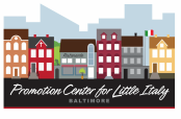
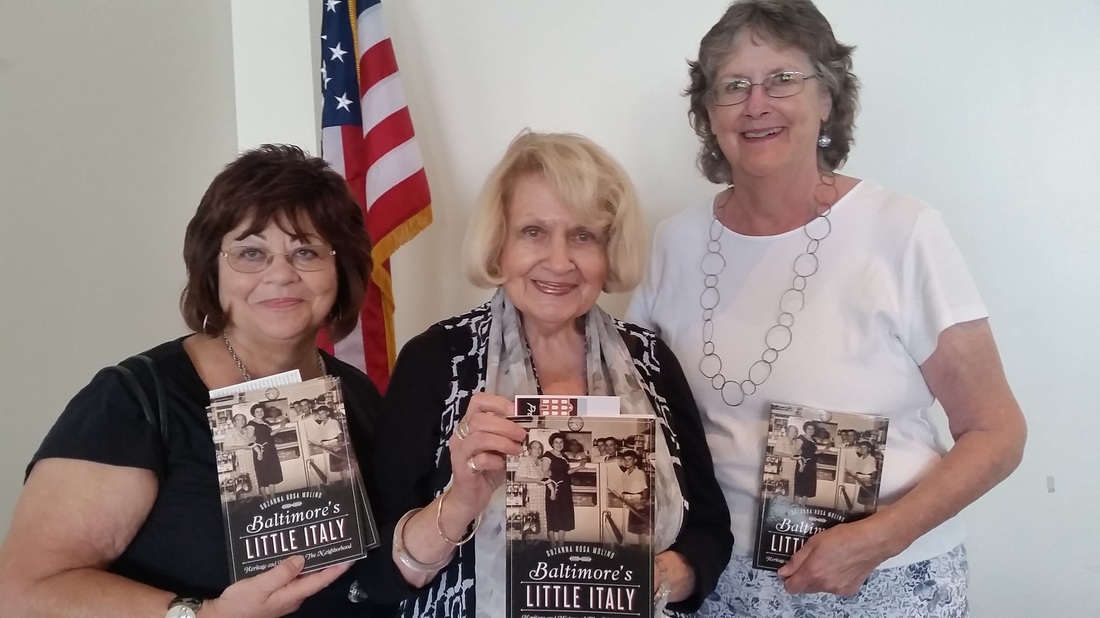


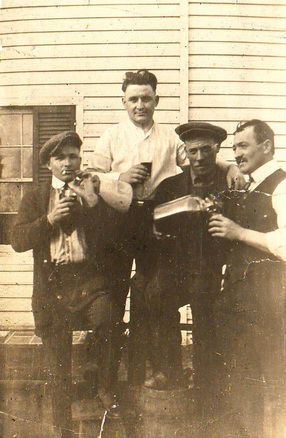
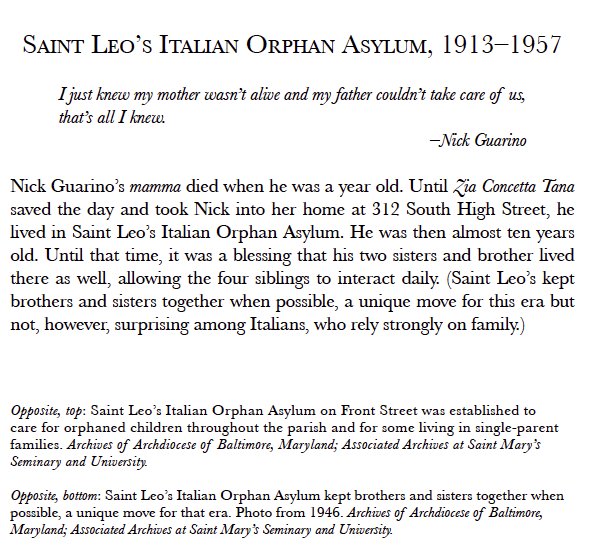
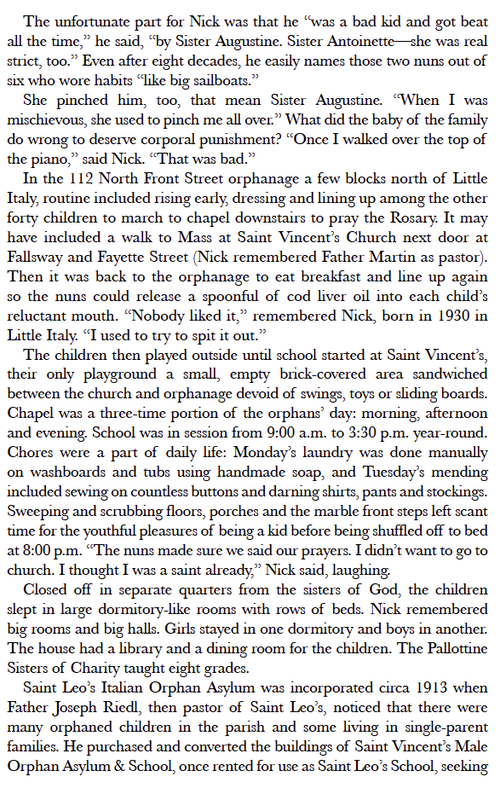
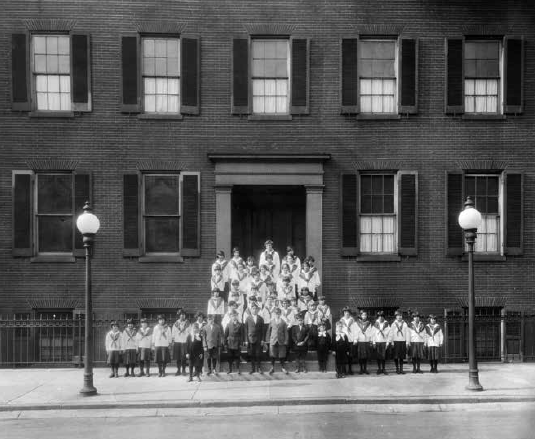
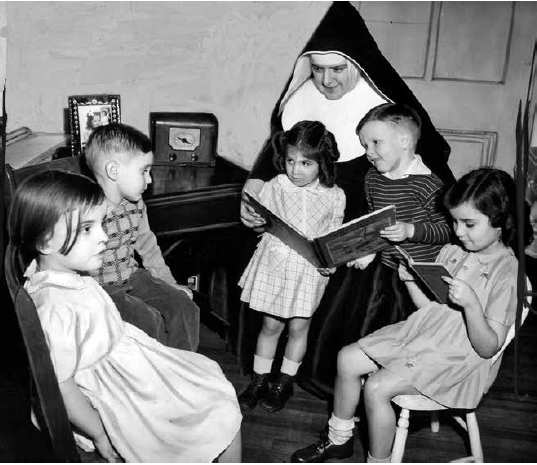
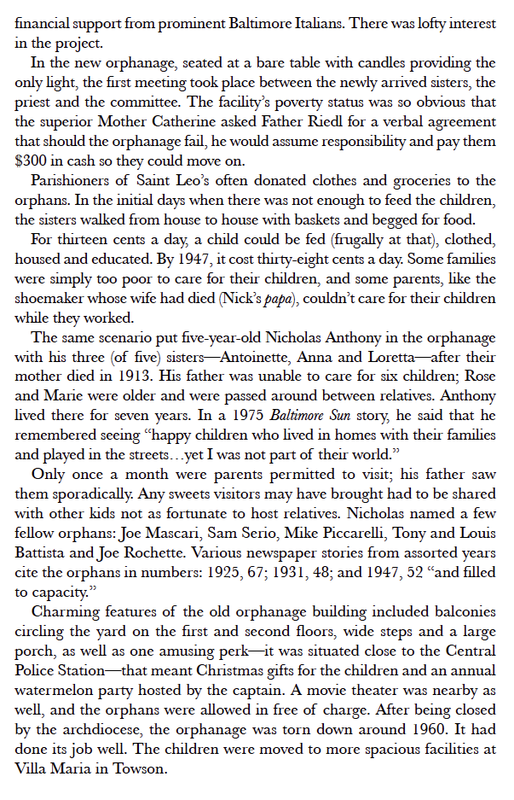
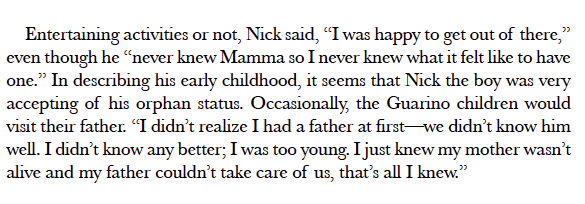

 RSS Feed
RSS Feed